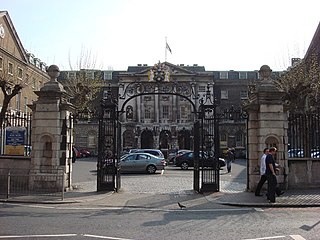Judgment
The Sex Discrimination Act 1975 does not cover sexuality discrimination. The Act was always meant to cover gender, not sexuality, and the comparators were gay people of the opposite sex. It was held that a gay man was the correct comparator for Pearce, and he would have been treated the same. Moreover, for the school, pupils were not agents, and so the school was not vicariously liable.
28. This submission, although not calling for decision, raises a point of some general importance. In Burton v De Vere Hotels Ltd [1997] ICR 1 two black waitresses, clearing tables in the banqueting hall of a hotel, were the butt of racist and sexist jibes made by a guest speaker entertaining the assembled all-male company at a private dinner party. The Employment Appeal Tribunal held that the employer of the waitresses had racially discriminated against the waitresses. Had the assistant managers in charge for the evening been properly instructed, the two young women would not have suffered embarrassment. They could, and should, have been withdrawn from the room.
29. This is not a satisfactory decision. Lindsay J, sitting as the President of the Employment Appeal Tribunal, has said the decision may be 'vulnerable': see Hussain v HM Prison Service (8 May 2002, unreported). Viewed in the broadest terms, the Burton decision has much to commend it. There is, surely, everything to be said in favour of a conclusion which requires employers to take reasonable steps to protect employees from racial or sexual abuse by third parties. But is a failure to do so 'discrimination' by the employer? Where the Burton decision is, indeed, vulnerable is that it treats an employer's inadvertent failure to take such steps as discrimination even though the failure had nothing to do with the sex or race of the employees. In this crucially important respect the decision gives insufficient heed to the statutory discrimination provisions. An essential element of 'direct' sex discrimination by an employer is that, on the grounds of sex, the employer treats the employee less favourably than he treats or would treat an employee of the opposite sex. Similarly with 'direct' racial discrimination: the 'less favourable treatment' comparison is an essential ingredient of the statutory wrong: see section 1(1)(a) of the Race Relations Act 1976. Unless the employer's conduct satisfies this 'less favourable treatment' test, the employer is not guilty of direct sex or racial discrimination. In making this comparison acts of persons for whose conduct an employer is vicariously responsible are to be attributed to the employer. It is otherwise in respect of acts of third parties for whose conduct the employer is not vicariously liable.
30. With this in mind, the reasoning in the Burton decision is unsatisfactory in two important respects. First, the tribunal proceeded on the basis that harassment which is race specific in form is itself less favourable treatment on racial grounds. In the case of racial harassment of a black person there is no need to show that a white person would have been treated differently. Counsel's concession on this point was based on an apparently widespread misinterpretation of the decision in Strathclyde Regional Council v Porcelli [1986] SC 137; [1986] ICR 564. This is a point I have already discussed.
31. Secondly, the harassment in Burton was committed by third parties for whose conduct the employer was not vicariously responsible. Despite this, the tribunal seems to have proceeded on the basis that the racial harassment of the waitresses by the speaker and some of the guests constituted discrimination on the part of the employer, and that the only issue left outstanding on the appeal, if the discrimination claim were to succeed, was whether the employers had by active or passive conduct subjected the waitresses to racial harassment by the speaker and the offending guests. This cannot be right. In order to succeed the two Caribbean waitresses had to prove discrimination by their employer.

United Kingdom labour law regulates the relations between workers, employers and trade unions. People at work in the UK can rely upon a minimum set of employment rights, which are found in Acts of Parliament, Regulations, common law and equity. This includes the right to a minimum wage of £9.50 for over-23-year-olds from April 2022 under the National Minimum Wage Act 1998. The Working Time Regulations 1998 give the right to 28 days paid holidays, breaks from work, and attempt to limit long working hours. The Employment Rights Act 1996 gives the right to leave for child care, and the right to request flexible working patterns. The Pensions Act 2008 gives the right to be automatically enrolled in a basic occupational pension, whose funds must be protected according to the Pensions Act 1995.
In employment law, constructive dismissal, also called constructive discharge or constructive termination, occurs when an employee resigns as a result of the employer creating a hostile work environment. Since the resignation was not truly voluntary, it is, in effect, a termination. For example, when an employer places extraordinary and unreasonable work demands on an employee to obtain their resignation, this can constitute a constructive dismissal.
Unfair dismissal in the United Kingdom is the part of UK labour law that requires fair, just and reasonable treatment by employers in cases where a person's job could be terminated. The Employment Rights Act 1996 regulates this by saying that employees are entitled to a fair reason before being dismissed, based on their capability to do the job, their conduct, whether their position is economically redundant, on grounds of a statute, or some other substantial reason. It is automatically unfair for an employer to dismiss an employee, regardless of length of service, for becoming pregnant, or for having previously asserted certain specified employment rights. Otherwise, an employee must have worked for two years. This means an employer only terminates an employee's job lawfully if the employer follows a fair procedure, acts reasonably and has a fair reason.

The Equal Pay Act 1970 was an Act of the Parliament of the United Kingdom that prohibited any less favourable treatment between men and women in terms of pay and conditions of employment. The Act was proposed by the then Labour government, and was based on the Equal Pay Act of 1963 of the United States. It has now been mostly superseded by Part 5, chapter 3! of the Equality Act 2010.

Janzen v Platy Enterprises Ltd [1989] 1 S.C.R. 1252 is a leading Supreme Court of Canada decision on discrimination. The Court found that sexual harassment was as a form of discrimination based on sex and so was prohibited by the Manitoba Human Rights Act.
United Kingdom employment equality law is a body of law which legislates against prejudice-based actions in the workplace. As an integral part of UK labour law it is unlawful to discriminate against a person because they have one of the "protected characteristics", which are, age, disability, gender reassignment, marriage and civil partnership, race, religion or belief, sex, pregnancy and maternity, and sexual orientation. The primary legislation is the Equality Act 2010, which outlaws discrimination in access to education, public services, private goods and services, transport or premises in addition to employment. This follows three major European Union Directives, and is supplement by other Acts like the Protection from Harassment Act 1997. Furthermore, discrimination on the grounds of work status, as a part-time worker, fixed term employee, agency worker or union membership is banned as a result of a combination of statutory instruments and the Trade Union and Labour Relations (Consolidation) Act 1992, again following European law. Disputes are typically resolved in the workplace in consultation with an employer or trade union, or with advice from a solicitor, ACAS or the Citizens Advice Bureau a claim may be brought in an employment tribunal. The Equality Act 2006 established the Equality and Human Rights Commission, a body designed to strengthen enforcement of equality laws.
The Employment Equality Regulations 2003 were secondary legislation in the United Kingdom, which prohibited employers unreasonably discriminating against employees on grounds of sexual orientation, perceived sexual orientation, religion or belief and age.
Redfearn v Serco Ltd [2006] EWCA Civ 659 and Redfearn v United Kingdom [2012] ECHR 1878 is a UK labour law and European Court of Human Rights case. It held that UK law was deficient in not allowing a potential claim based on discrimination for one's political belief. Before the case was decided, the Equality Act 2010 provided a remedy to protect political beliefs, though it had not come into effect when this case was brought forth.
Coleman v Attridge Law (2008) C-303/06 is an employment law case heard by the European Court of Justice. The question is whether the European Union's discrimination policy covers not just people who are disabled but people who suffer discrimination because they are related or connected to disabled people. At the beginning of 2008, Advocate General Maduro delivered his opinion, supporting an inclusive approach. He said discrimination law is there to combat all forms of discrimination, including those connected to protected groups of people.
English v Sanderson Blinds Ltd [2008] EWCA Civ 1421 is a UK labour law case on the question of whether a person can claim discrimination for sexuality without being actually gay. The Court of Appeal decided that it was irrelevant whether someone was gay or not or the bullies believe the person is gay or not, if the harassment has sexuality as its focus.
Equal Opportunities Commission v Secretary of State for Trade and Industry [2007] IRLR 327 was an application for judicial review of the new implementation by the government of the Employment Equality Regulations 2005. It was alleged, and found, that they were incompatible with the Framework Directive, 2000/73/EC.

Smith v Gardner Merchant [1998] IRLR 510 is a UK labour law case, concerning the possibility of claiming compensation for discrimination under the gender statutes. It took place before the Employment Equality Regulations 2003 were introduced.
O'Hanlon v Revenue and Customs Commissioners [2007] EWCA Civ 283 is a UK labour law case concerning disability discrimination.
Eagle Place Services Ltd v Rudd [2010] IRLR 486 is a UK labour law case, concerning disability discrimination.

Majrowski v Guy's and St Thomas' NHS Trust [2006] UKHL 34 is a UK labour law case holding that an employer will be vicariously liable for the harassment of an employee by another.

Chief Constable of West Yorkshire Police v Khan [2001] UKHL 48 is a UK labour law case concerning the test for victimisation and the legitimate steps an employer can take after dismissed a person who is bringing a discrimination claim against them.

Ladele v London Borough of Islington [2009] EWCA Civ 1357 is a UK labour law case concerning discrimination against same sex couples by a religious person in a public office.

Stefanko v Doherty and Maritime Hotel Ltd [2019] IRLR 322 (EAT) is a UK labour law case, concerning unfair dismissal and discrimination.

Asda Stores Ltd v Brierley [2021] UKSC 10 is a UK labour law case, concerning equal pay and comparators.
Royal Mail Group Ltd v Efobi [2021] UKSC 33 is a UK labour law case, concerning race discrimination and the burden of proof.








